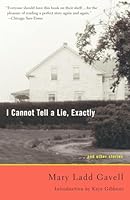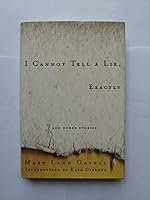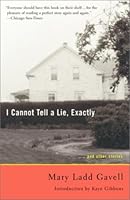- Welcome to FictionDB, Guest
- | My Account
- | Help

I Cannot Tell a Lie, Exactly: and Other Stories — Mary Ladd Gavell
buy the book from amazon
Paperback editions:
Hardcover editions:
eBook editions:
Audio editions:
Large Print editions:
Browse Similar Books at Amazon
Literature & Fiction->Short Stories & Anthologies->Short Stories
Description
Mary Ladd Gavell died in 1967 at the age of forty-seven, having published nothing in her lifetime. She was the managing editor of Psychiatry magazine in Washington, D.C., and after her death, her colleagues ran her story "The Rotifer" in the magazine as a tribute. The story was, somehow, plucked from that nonliterary journal and selected for The Best American Short Stories 1967. And again, thirty-three years later, "The Rotifer" emerged from near obscurity when John Updike selected it for The Best American Short Stories of the Century. In his Introduction to that collection, Updike called Gavell's story a "gem" and said that her writing was "feminism in literary action."
"The Rotifer" has remained, until now, Gavell's only published work.
The sixteen stories collected here include the anthologized classic "The Rotifer," in which a young woman learns the extent to which a bit of innocent interference, or the refusal to interfere, can change the course of lives. "The Swing" depicts a mother's strange reconnection to her adult son's childhood as she is summoned outside, night after night, by the creak of his old swing. "Baucis" introduces a woman longing for widowhood who is cheated of the respite she craves and whose last words are tragically misunderstood by her family. The title story, based on the last-minute announcement by Gavell's own son that he was in a school play, is infused with the gentle humor and vivid insights that make all of Mary Ladd Gavell's stories timeless and utterly beguiling.
With the publication of I Cannot Tell a Lie, Exactly, Mary Ladd Gavell takes her rightful place among the best writers of her, and our, time.
CERTAIN CONTENT THAT APPEARS ON THIS PAGE COMES FROM AMAZON. THIS CONTENT IS PROVIDED ‘AS IS’ AND IS SUBJECT TO CHANGE OR REMOVAL AT ANY TIME.



 Amazon UK
Amazon UK